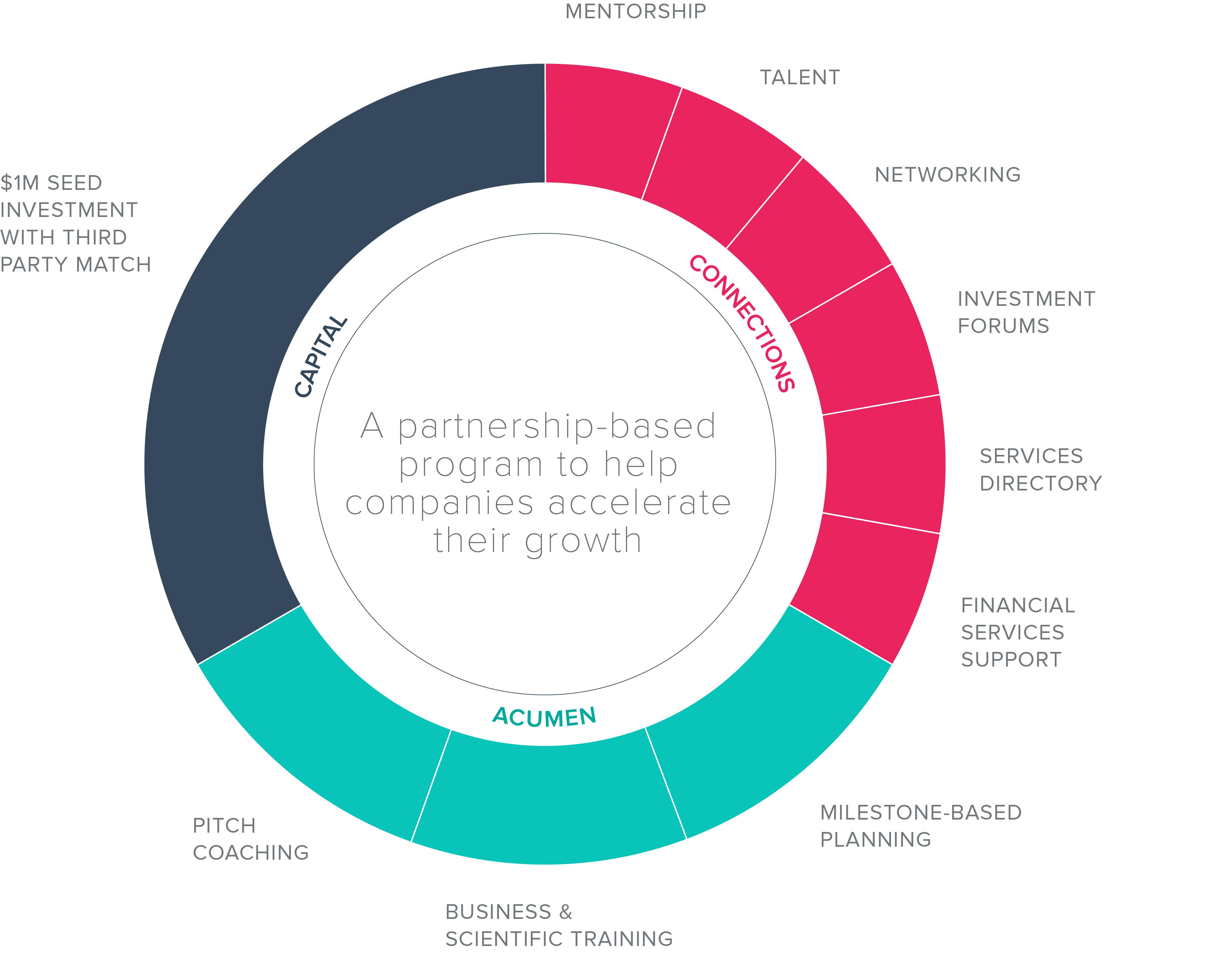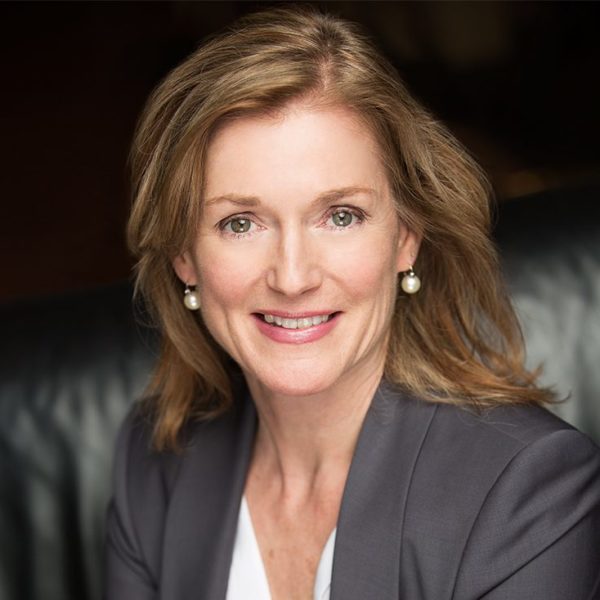Accel-Rx is a nation-wide accelerator, providing seed capital to bridge the financing gap for the commercialization of life science innovations. Their unique program structure has proven successful, with five of their 10 portfolio companies already completing successful Series A rounds.
Why is Accel-Rx so successful in helping life science companies succeed? Interview with Natalie Dakers, President and CEO.
Accel-Rx identified a gap in funding for seed stage companies. Can you expand on why that is, and how you’re addressing it?
In life sciences, we don’t have a lot of seed capital available. Often companies bootstrap and work with very little.
Accel-Rx was created to help companies overcome this hurdle to become Series A investor ready. What we were finding is that start-ups were doing seed rounds, yet weren’t raising money beyond that. They needed support, so we’ve created a customized approach to bridge that gap and help take them from the seed stage to landing a successful Series A.
Specifically, your process is based on capital, connections and acumen — can you speak to this?
Accel-Rx provides seed capital and expertise to help fuel the growth of new ventures and help them become investor ready. We work in partnership with each company to assess development gaps and determine each company’s programming needs. The goal is to provide the necessary expertise, resources, training and networking to accelerate their growth.

For example, we help them create realistic budgets; we make sure their financing strategy is connected to what their business is going to need; we look at what they can do to clean their cap table up; we help them develop their pitch and build out the appropriate team and governance—all so they can be ready to land their Series A.
What role does mentorship play in making health sciences companies successful?
Mentorship provides support to entrepreneurs, so they’re better positioned to succeed.
We’ve adopted peer to peer mentoring, an approach that was created a number of years ago at the Massachusetts Institute of Technology. We match a group of three to four seasoned CEOs with a startup CEO. The benefit is that the young venture receives a variety of perspectives. The program goes on as long as the entrepreneur is getting benefit and value, while the mentorship team evolves to meet the company’s needs, so it’s well-suited to the long development time associated with therapeutic development.
The other advantage of this model is that the mentors are CEOs themselves. They are not potential investors or service providers trying to get a contract; therefore, they are solely focused on making the mentee successful. Our program provides ventures access to seasoned experts who have done it before on a regular basis. They can discuss any issue in a safe environment.
What are the unique challenges for health science companies to scale in the marketplace / the Canadian marketplace?
Growth capital is a big issue in Canada. We don’t have the IPO markets to get what is required. Raising $50-60 million out of Canadian investors – which you need by the time you’re reaching Series C – is very hard to do and means companies have to access foreign capital if you’re growing a biotech company here.
In order to raise that kind of money, you have to be globally competitive and reach those critical milestones proving you are worthy and capable. That’s why what we’re doing from a support function is so important.
Are you seeing any increases in female-led startups in the health sciences area? Any notable examples / reasons why or why not?
We are greater than 50% female at Accel-Rx. We’re highly supportive and involved in supporting gender balance and run programs to that end. Among our portfolio companies, there are women in senior executive positions, but none are run by women CEOs. Within our mentoring program, one-third of CEOs are women. This still needs to increase, and we need to be looking at bigger recruitment pools.
There are venture funds recently created specifically for female leaders. And in digital health, we do see a better balance, so I think it is slowly changing.
What success stories have come out of Accel-Rx?
Our biggest measurement of success is ‘Do our portfolio companies move on to a Series A?’ That’s why we’re here.
In the relatively short time we’ve been investing, we’ve already had five companies complete a Series A.
We’ve invested $5M in 10 start-ups, which has enabled another $44.6M in co-investment – a leverage ratio of 8.9. Three of these start-ups have secured $45.1M in follow-on funding, which is significant.
We’ve also really changed the landscape in terms of syndicate size at the seed stage. We’re only able to invest up to $500K per venture, but they need a lot more. Through our rigorous diligence and relationships with the investment community, we’ve grown our average deal size to $4-5M from $1-2M at the seed level; that is a significant positive impact of which we are proud.
What are the emerging trends in health sciences?
There’s a huge wave in terms of digital health, and specifically digital therapeutics, with massive amounts of money being raised in this area, but it’s not something we’re seeing yet in Canada. I haven’t been able to put my finger on it as to why. Canada has a number of digital health companies, but most of them are not regulatory bound.
With respect to reimbursement, it complicates matters enormously in Canada that there are different rules in every province and companies must address each region specifically. We have overall regulatory oversight through Health Canada for approvals, but we need to move toward a national formulary to make it easier to sell products here.
In general, the convergence of health and technology is coming fast and furious. There are lots of opportunities that we could take better advantage of, and niches that we could get into that could be globally competitive, particularly if we find a way to use the enormous data that exists in Canada. It’s definitely something that we’re excited about for the future.
About Natalie Dakers

Natalie Dakers, Founding President and Chief Executive Officer, is a leading figure in the Canadian biopharmaceutical industry and is one of Canada’s most influential women. With four start-up companies to her credit, she’s known for getting things done.
Natalie is currently President and CEO of Accel-Rx, Canada’s national health sciences accelerator. Prior to Accel-Rx, she was founding President and CEO of CDRD Ventures Inc., the commercial arm of the Centre for Drug Research and Development (CDRD) that supported company creation. Natalie was also the founding CEO of the Centre for Drug Research and Development (CDRD), a national Centre for Excellence for Commercialization and Research. She also co-founded Neuromed Pharmaceuticals Inc., a private biopharmaceutical company developing drugs for chronic pain, anxiety, epilepsy, and cardiovascular diseases and raised $70 million in three rounds of venture financing.
Natalie is currently a board member of BIOTECanada and Augurex Inc. and an Adjunct Professor in UBC’s Faculty of Pharmaceutical Sciences. She’s served on many local, national, and private company boards and advisory panels and has garnered numerous honours most recently the 2019 LifeSciences BC Milton Wong Award for Leadership and Canada’s Most Powerful Women: Top 100 Award Winner in the CIBC Trailblazers & Trendsetters category in 2018 from the Women’s Executive Network. Click here for more bio details.

